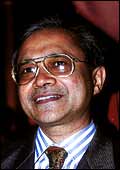 |
| Data Access' founder Siddhartha
Ray: My lips are sealed |
Data access commenced
its ILD (international long distance) operations in July 2002.
Its revenues zoomed from Rs 93 crore in 2001-02 to Rs 611 crore
in 2002-03 (year ending September). And it planned a public issue
of five crore equity shares (face value Rs 10 each) in March,
2004 at an offer price of Rs 17-20 on the back of this spectacular
growth. But the IPO was torpedoed at the eleventh hour because
of objections raised by the Department of Telecommunications (dot).
What went wrong? Government officials say
the company has discontinued its operations six-seven months ago.
Data Access founder Siddhartha Ray, who sold the company to a
consortium led by Chennai-based entrepreneur K.C. Palanisami last
year, declined to comment on the matter. Palanisami, who is a
former mp, blames conspiracies and systemic irregularities for
the crisis. "But it's time to revive the company," he
says.
That may take some time. BSNL has filed a winding-up petition
against Data Access in the Delhi High Court over the non-payment
of outstandings of around Rs 200 crore. Cheques worth Rs 82 crore
issued by the company to BSNL have bounced, resulting in a criminal
case against Data Access.
Government officials say the licence will
be restored after Data Access clears its dues of around Rs 300
crore. "It must pay 75 per cent of the unpaid amount upfront
and the remaining 25 per cent within a year," they add.
Meanwhile, Data Access has filed a petition
in Chennai High Court to revive the company and restore its points
of interconnection. The wrangling, it seems, will continue for
some time.
-Kumarkaushalam
ALIVE
Back On The Road
 |
| We're back: Premier's Roadstar (top)
and Sigma |
 |
Premier limited,
which dropped 'automobile' from its name in April 2005, is coming
out of hibernation. On May 11, 2005, it launched Sigma, a multi-purpose
vehicle (MPV), and Roadstar, a light commercial vehicle (LCV).
"The seven-seater Sigma is positioned as a family vehicle,
while the Roadstar is targeted at the transport business,"
informs Premier's Head of Sales & Marketing, Atul Akolkar.
For now, the vehicles, which run on diesel, are available only
in South India. They will be launched in other parts of the country
in a phased manner by the middle of next year. Premier, which
is making the vehicles in collaboration with China Motor Corporation,
will manufacture them at its Chinchwad factory in Pune, which
has a capacity of 10,000 vehicles per annum. The Sigma costs Rs
3.95 lakh while the Roadstar comes at Rs 3.25 lakh (both ex-Pune).
Not everyone is impressed, though. "They are nothing great
and look quite crude," said Auto Car Editor Hormazd Sorabjee.
-Krishna Gopalan
Paper
Tigers
Newspaper alliances are unsustainable in
the long run.
 |
 |
| Joining hands: ToI's Sameer
Jain (L) and HT's Shobhana Bhartia |
The
list of failed marriages would make Liz Taylor blush. The Hindu-Eenadu,
HT-Indian Express-Mid-Day, HT-Amar Ujala and The Statesman-Bartaman
have all tried it in the past. And most have failed. Why? "In
most cases, newspapers come together to confront some immediate
threat," says Sandeep Viz, President of Mudra's media agency
Optimum Media Solutions (OMS). This implies that there is little
rationale to continue the partnership once the storm has blown
over. But that hasn't stopped The Times of India (TOI) from joining
forces with Hindustan Times (HT) to take on the Zee-Dainik Bhaskar
combine's yet-to-be-launched Daily News & Analysis (DNA) in
Mumbai.
"How can anyone succeed if the basic
objective is to spoil someone else's party?" asks Meenakshi
Madhvani, Managing Director of media audit company Spatial Access.
Bang on. The Hindu-Eenadu deal was aimed at Deccan Chronicle in
the Andhra Pradesh market. HT and Amar Ujala came together against
Dainik Jagran in the Hindi heartland. And the HT-Indian Express-Mid-Day
combine took on Mumbai big daddy TOI. In that sense, all these
alliances were defensive in nature; none of them attempted to
expand their own businesses.
"Ours is merely a commercial transaction
and does not signal the formation of a cartel against DNA,"
says a senior manager at HT, defending his paper's collaboration
on printing, advertising and no-poaching with arch rival TOI,
adding: "We did offer our excess printing capacity in Mumbai
to DNA."
Most of the earlier alliances, though alive
on paper, are quite dead on the ground. Obviously, "an enemy's
enemy is a friend" is not a sustainable business strategy.
For example, selling advertising through a common rate card is
a self-defeating proposition. "There is a 10-15 per cent
discount on these combined rate cards, which a big media agency
gets anyway," informs Spatial's Madhvani, highlighting the
pointlessness of the whole exercise. The only aspect of the deal
that can work is the no-poaching agreement. That's the global
experience across industries. But here, too, there are huge question
marks. Such deals depend entirely on the good faith of the parties
concerned. Is it too much to expect such things in the fiercely
competitive Rs 1,000-crore Mumbai newspaper market? Watch this
space.
-Shailesh Dobhal
GLITTER
Curious Branding
 |
| Actor Mukherjee: The Tanishq look |
Had it been an
Agatha Christie mystery, it would probably have been titled 'The
curious affair at Paheli'. Titan's jewellery division, Tanishq,
designed the heroine's jewellery collection for the Shah Rukh
Khan-Rani Mukherjee starrer Paheli. "We did it to capture
audiences we normally don't through our marketing efforts,"
says Ruchira Puri, Head (Marketing & Design), Tanishq. Really?
How? Tanishq's name appears only in the credits of the Amol Palekar
film; but who bothers to read the credits anyway? There is no
mention or visual of the brand anywhere else. So the company is
spending "substantial sums of money" on television ads
featuring shots from Paheli showing Mukherjee decked in jewellery,
with a voice-over informing us that Tanishq is behind it all.
And how does the company intend to recover its costs? "We'll
sell Tanishq's Paheli collection, priced at Rs 20,000 to Rs 3.5
lakh, across 20 of our 73 stores," says Puri. Film- and television-based
merchandise sales haven't quite kicked off in India as it has
in the West. Can Paheli be the first to buck this trend? Marketers
will be keenly watching out for this.
-Shailesh Dobhal
POLITY WATCH
Cleaning The Augean Stables
The J.J. Irani Report on Company Law will
bring transparency to the fore.
 |
| Irani Committe's J.J. Irani: Laying
down the rules |
We
have given full liberty to shareholders and promoters to run companies.
But in case of violations, the penalties will be stringent,"
says J.J. Irani, Chairman of the Irani Committee Report on Company
Law. If the main focus of the 177-page document was to achieve
the above objectives, Irani, who is a Director on the board of
Tata Sons, has done a great job. The central theme of his recommendations:
make the Companies Act of 1956 more compact, enunciate only the
broad principles and leave rule-making to the authorities, and
ensure adequate protection for stakeholders and shareholders including
small investors.
The report, which has to be cleared by the
Union Cabinet before it can be implemented, recommends doing away
with a host of restrictions that has shackled Indian entrepreneurship
for decades. It suggests the removal of restrictions on the number
of subsidiaries a company can have and wants the ceiling on directors'
remuneration scrapped. It also wants independent directors to
make up only one-third of the board strength, compared to the
50 per cent stipulation currently in place. Irani also proposes
to speed up the process of incorporating and liquidating companies,
and counsels giving more teeth to the Registrar of Companies.
The panel's most revolutionary suggestion
is the concept of a "one-person company". Existing laws
mandate corporates to be an "association of persons".
This change is likely to provide a definitive push to entrepreneurship.
Moreover, by shifting from a "government approved" regime
to a "shareholder approval and disclosure" regime, the
Irani panel has begun, what Kaushik Dutta, Partner, PricewaterhouseCoopers,
calls "an era of self-regulation for corporate India".
Given the man's track record and reputation,
it was expected that he would devote considerable attention to
corporate governance. And Irani doesn't disappoint. He even brings
celebrities, who lend their glamour to corporate boards, under
the scanner. If such companies vanish, they cannot disown their
association with it; they will have to share the liabilities.
Says Irani: "Any director who sits on the board at the time
of investment/ public issue will be held responsible for at least
two years.''
Irani also focusses considerable attention
on the issue of vanishing companies. He is obviously not one of
those who will wait for the horse to bolt before he closes the
stable door. Instead, the panel favours scrutiny from registration
through the life of the company. How? By making the filing of
statutory documents mandatory. And, striking a blow for the rights
of the small investor, he wants companies to compulsorily publish
information relating to convictions for criminal breaches of the
Companies Act in annual reports.
Expectedly, perhaps, such missionary zeal
has not gone down well with some of his peers. The Chairman of
Bajaj Auto, Rahul Bajaj, says the whistle-blower policy, for instance,
"is clearly not well-thought out. How do you ensure that
disgruntled elements will not lodge false or frivolous complaints?"
And if that policy becomes law, companies should have the right
to terminate the services of such employees if the case is found
to be frivolous. Another CEO, who refuses to go on record, feels
it could tempt some managements to plant moles in rival companies
to create trouble. "The J.J. Irani report is far too idealistic
for today's times," he adds.
Then, there is little clarity on whether
independent directors can continue to sit on boards after three
terms (nine years in all, as recommended by the earlier Narayana
Murthy Committee report). Moreover, Irani's insistence that nominee
directors should not be treated as independent directors has not
gone down too well with India Inc.
However, given the spate of corporate scandals
around the world, the report has shown a lot of courage by giving
directors the authority to regulate the affairs of companies.
Its acceptance will go a long way in bringing Indian corporate
governance practices in line with the best in the world.
-Ashish Gupta
|










